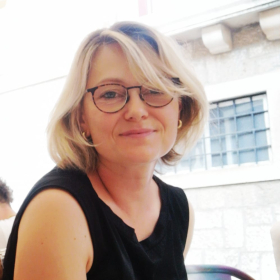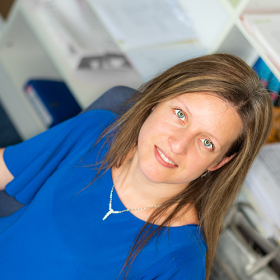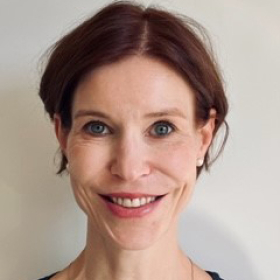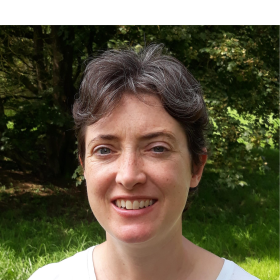

Marcela (Lawyer-linguist - Court of Justice of the EU)
“Volám sa Marcela a pochádzam zo Slovenska.
Vyštudovala som Právnickú fakultu UPJŠ v Košiciach.
V čase, keď som končila štúdium práva, Slovensko bolo krátko pred vstupom do EÚ a mne bolo už vtedy jasné, že chcem byť súčasťou európskeho projektu. V Bratislave som sa začala venovať aproximácii práva a keďže ma vždy bavili aj jazyky, postupne som sa špecializovala na prekladanie legislatívy EÚ a rozsudkov Európskeho súdu pre ľudské práva.
V súčasnosti pracujem ako právnička lingvistka na slovenskej sekcii Generálneho riaditeľstva pre multilingvizmus na Súdnom dvore EÚ v Luxemburgu. Pri mojej práci sa odo mňa očakáva skĺbenie právnických vedomostí so znalosťou jazykov a zároveň sústavné vzdelávanie v právnickej aj jazykovej oblasti, a to v multikultúrnom a multijazyčnom prostredí. V závislosti od konkrétneho druhu súdneho konania sa venujem analýze, prekladu a revíziám rôznych typov dokumentov. Moja práca mi umožňuje byť súčasťou procesov, ktoré vychádzajú z cieľa jazykového režimu Súdneho dvora – šíriť judikatúru do všetkých členských štátov a poskytovať prístup k spravodlivosti pre všetkých občanov EÚ. Práve preto ma baví a napĺňa.”
***
“My name is Marcela and I come from Slovakia.
I graduated from the Faculty of Law at the University of P. J. Šafárik in Košice.
When I finished my legal studies, Slovakia was just about to join the EU and it was clear to me at that time that I wanted to be part of the European project. In Bratislava, I started to work on approximation of laws, and as I have always been interested in languages, I gradually specialised in translating EU legislation and judgments of the European Court of Human Rights.
Currently, I work as a lawyer-linguist in the Slovak section of the Directorate General for Multilinguism at the Court of Justice of the European Union in Luxembourg. My work requires me to combine legal knowledge with language skills and requires continuous training in both legal and linguistic fields, in a multicultural and multilingual environment. Depending on the specific type of legal proceedings, I analyse, translate and revise different types of legal documents. In this position, I am part of the processes which are based on the objective of the Court of Justice's linguistic regime - to disseminate case-law to all Member States and to provide access to justice for all EU citizens. That is why I enjoy and find this work fulfilling.”

Ieva (Lawyer-linguist - Court of Justice of the EU)
“Suderinti teisės žinias ir pomėgį kalboms – visiškai įmanoma! Būtent tai mes, teisininkai lingvistai, darome kasdien, ieškodami sąsajų tarp skirtingų ES valstybių narių teisės sistemų, perteikdami jų skirtumus, gilindamiesi į teisinius terminus ir kalbines raiškos formas skirtingomis šių valstybių kalbomis. Dirbdama teisininke lingviste Teisingumo Teisme, atradau, kad tiek Lietuvos, tiek bet kurios kitos valstybės narės teisė visgi nėra tik nacionaliniu lygmeniu pritaikoma sritis, kad jos žinias galima pritaikyti daug plačiau, taip pat gilinti žinias įvairiose teisės srityse. O kur dar galimybė gyventi ir dirbti daugiakalbėje ir daugiakultūrėje aplinkoje, kai kalbų mokaisi ne vien iš vadovėlio, o susiduri su jomis nuolat, jų įvairovė tampa įprasta kasdienybe. Pabandykite ir įsitikinsite – šis darbas labai įdomus!”
***
“It‘s absolutely possible to combine your legal knowledge and vocation to learn languages! This is exactly what we do every day as lawyer linguists, looking for links and relations between the legal systems of different EU member states, conveying their differences, going into details when we search for appropriate terms and forms of expression, so that our translation does not look like translation, but more as if the text would be elaborated in our own language. Working as lawyer linguist at the Court of Justice, I found out that the national law of Lithuania (and of any other member state) is not only relevant at the national level, that I can apply this knowledge much more widely and learn something new in different law areas as well. In addition, I should mention the opportunity to live and to work in a multilingual and multicultural environment where you learn languages not only from a textbook, but are constantly surrounded by people speaking these languages, this diversity becomes a part of everyday life. Just try and you will see that this work is very interesting!”

Veronika (Lawyer-linguist - Court of Justice of the EU)
“Ako právnička lingvistka na Slovenskej prekladateľskej sekcii Súdneho dvora EÚ pracujem už 16 rokov. Rozhodnutie prijať ponuku Súdneho dvora nebolo jednoduché, keďže som zvažovala rodinné dôvody. No pracovať pre tak významnú inštitúciu bolo pre mňa veľkou výzvou, ktorú som sa rozhodla prijať. Svoje rozhodnutie som neoľutovala.
Náplňou tejto práce sú preklady a revízie dokumentov Súdneho dvora, ako sú rozsudky, uznesenia a návrhy generálnych advokátov. Prekladáme tiež návrhy na začatie prejudiciálneho konania podané slovenskými súdmi, pripravujeme zhrnutia takýchto návrhov a pre potreby ostatných oddelení Súdneho dvora vykonávame rôzne právne analýzy. Podieľame sa aj na projektoch v oblasti terminológie, ako aj verejného obstarávania na uzavretie zmlúv s externými prekladateľmi.
Ja osobne vnímam ako najväčšie pozitívum práce pre Súdny dvor možnosť kontinuálneho odborného vzdelávania. Súdny dvor ponúka širokú škálu školení: od odborných, cez štúdium jazykov, prehlbovanie si znalostí v oblasti informačných technológií, až po školenia zamerané na osobný manažment.
Taktiež veľmi oceňujem dôsledné dodržiavanie rovnosti medzi ženami a mužmi a dôraz Súdneho dvora na duševnú a pracovnú pohodu svojich pracovníkov.
Cením si tiež dostatočnú flexibilitu, ktorú máme pri výkone našej práce, čo nám umožňuje skĺbiť pracovný a rodinný život. Na našom oddelení panujú dobré kolegiálne vzťahy, čo je nepochybne dôležitým prvkom pohody na pracovisku.
Práca právnika lingvistu je vhodná pre každého, kto má právnické vzdelanie a baví ho pracovať s jazykmi a ďalej sa v týchto oblastiach rozvíjať. Ak vás táto pracovná pozícia zaujala, určite sa do výberového konania na právnikov lingvistov pre Súdny dvor prihláste.”
***
“I have been working as a lawyer-linguist in the Slovak translation unit of the Court of Justice of the EU for 16 years. The decision to accept the offer of the Court of Justice was not an easy one because as I was considering family reasons. However, working for such an important institution was a great challenge for me, which I decided to accept. I have not regretted my decision.
This work involves translating and revising documents of the Court of Justice, such as judgments, orders and opinions of the Advocates-General. We also translate references for preliminary rulings from Slovak courts, prepare summaries of such references and perform, for the needs of other departments, various legal analyses. We are also involved in projects in the field of terminology, as well as tendering for freelance translators.
Personally, I see the opportunity for continuous professional training as the greatest positive aspect of working for the Court of Justice. The Court of Justice offers a wide range of training, such as professional training, language learning, deepening knowledge in the field of information technology or training in personal management.
I am also very appreciative of the Court's strict adherence to equality between women and men at work and the Court's emphasis on the mental and occupational well-being of its staff.
I also appreciate the flexibility we have in the performance of our work, which allows us to combine work and family life. There are good collegial relations in our department, which is undoubtedly an important element of well-being in the workplace.
The job of a lawyer-linguist is suitable for anyone who has a legal background and enjoys working with languages.”

Helen (Lawyer-linguist - Court of Justice of the EU)
“I joined the English translation unit at the Court of Justice after completing a degree in French and Czech, followed by a law conversion course and then the LPC. I was keen to use my language skills and was interested in legal drafting, so the job appealed to me from the outset.
However, while legal writing skills are an important part of our work, the role of a lawyer-linguist involves much more than translation. We are called on to liaise with members of the Judges’ chambers on the precise meaning and nuances to be given to a finished translation and in my time here I have been involved in terminology work, mentoring and recruitment. I have followed a wide range of training courses, covering the latest information technology tools, European and comparative law and personal development. We are also encouraged to acquire additional languages, in my case Spanish and Polish.
In my view, a career as an EU lawyer-linguist is stimulating and rewarding for anyone who enjoys word-play and problem solving. It is also fascinating to work at the forefront of the latest developments in EU law.”

Jack K. (European Commission)
“People sometimes give Luxembourg a bad reputation when it comes to nightlife. These people have obviously never experienced the eve preceding the Grand Duchy’s national day (23 June). Hundreds of thousands flock the capital’s picturesque medieval streets to watch the magnificent light and firework display, no expense spared of course! Every street has a DJ or a band playing and all the bars are open until dawn! My tip, grab a bottle of excellent Luxembourgish sparkling wine and head down to the valley of the Pétrusse to get an unobstructed view of the fireworks. Then wander through the medieval Grund quarter and enjoy the music and dancing.”

Jack K. (European Commission)
“Brussels is a very green city and in order to enjoy it to the full, once or twice a year with family and friends we hop on our bikes and cycle the promenade verte. This 60km bike itinerary loops around the city and takes you through many of its communes on paths that pass, for the most part, through its green spaces. It’s always a fun and relaxing experience to cycle through the great trees of the Sonian forest, the landscaped 19th century park of Woluwe and the green fields and ponds of Anderlecht. At around five hours long, cycling at a leisurely pace there’s always time to stop for an ice-cream or a beer on the way.”

